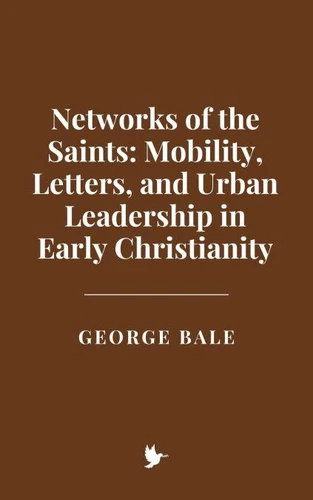Networks of the Saints: Mobility, Letters, and Urban Leadership in Early Christianity
Par :Formats :
Disponible dans votre compte client Decitre ou Furet du Nord dès validation de votre commande. Le format ePub est :
- Compatible avec une lecture sur My Vivlio (smartphone, tablette, ordinateur)
- Compatible avec une lecture sur liseuses Vivlio
- Pour les liseuses autres que Vivlio, vous devez utiliser le logiciel Adobe Digital Edition. Non compatible avec la lecture sur les liseuses Kindle, Remarkable et Sony
 , qui est-ce ?
, qui est-ce ?Notre partenaire de plateforme de lecture numérique où vous retrouverez l'ensemble de vos ebooks gratuitement
Pour en savoir plus sur nos ebooks, consultez notre aide en ligne ici
- FormatePub
- ISBN8231311354
- EAN9798231311354
- Date de parution23/05/2025
- Protection num.pas de protection
- Infos supplémentairesepub
- ÉditeurWalzone Press
Résumé
This book explores the vibrant and interconnected world of early Christianity through the lens of mobility, communication, and urban leadership. Tracing the journeys of apostles, missionaries, and co-workers like Paul, Priscilla and Aquila, and Ignatius of Antioch, it reveals how early Christian leaders navigated the sprawling cities of the Roman Empire to build resilient networks of faith and fellowship.
By examining the critical role of letters as tools of governance and unity, the practice of hospitality as social and spiritual sustenance, and the emerging structures of authority centered in urban congregations, the study uncovers how scattered communities maintained doctrinal coherence and communal identity across diverse cultural and geographic landscapes. Combining detailed historical analysis with theological reflection, the book illuminates the dynamic processes through which early Christianity transformed from a localized sect into a universal Church, rooted in shared language, ritual, and memory.
A scholarly contribution to the history of Christianity, it offers fresh insights into the social fabric and leadership dynamics that underpinned the faith's expansion.
By examining the critical role of letters as tools of governance and unity, the practice of hospitality as social and spiritual sustenance, and the emerging structures of authority centered in urban congregations, the study uncovers how scattered communities maintained doctrinal coherence and communal identity across diverse cultural and geographic landscapes. Combining detailed historical analysis with theological reflection, the book illuminates the dynamic processes through which early Christianity transformed from a localized sect into a universal Church, rooted in shared language, ritual, and memory.
A scholarly contribution to the history of Christianity, it offers fresh insights into the social fabric and leadership dynamics that underpinned the faith's expansion.
This book explores the vibrant and interconnected world of early Christianity through the lens of mobility, communication, and urban leadership. Tracing the journeys of apostles, missionaries, and co-workers like Paul, Priscilla and Aquila, and Ignatius of Antioch, it reveals how early Christian leaders navigated the sprawling cities of the Roman Empire to build resilient networks of faith and fellowship.
By examining the critical role of letters as tools of governance and unity, the practice of hospitality as social and spiritual sustenance, and the emerging structures of authority centered in urban congregations, the study uncovers how scattered communities maintained doctrinal coherence and communal identity across diverse cultural and geographic landscapes. Combining detailed historical analysis with theological reflection, the book illuminates the dynamic processes through which early Christianity transformed from a localized sect into a universal Church, rooted in shared language, ritual, and memory.
A scholarly contribution to the history of Christianity, it offers fresh insights into the social fabric and leadership dynamics that underpinned the faith's expansion.
By examining the critical role of letters as tools of governance and unity, the practice of hospitality as social and spiritual sustenance, and the emerging structures of authority centered in urban congregations, the study uncovers how scattered communities maintained doctrinal coherence and communal identity across diverse cultural and geographic landscapes. Combining detailed historical analysis with theological reflection, the book illuminates the dynamic processes through which early Christianity transformed from a localized sect into a universal Church, rooted in shared language, ritual, and memory.
A scholarly contribution to the history of Christianity, it offers fresh insights into the social fabric and leadership dynamics that underpinned the faith's expansion.

















